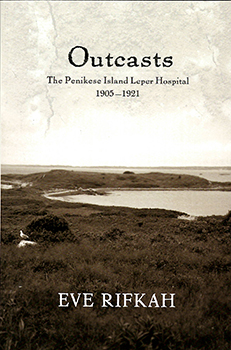
Outcasts documents the persona of the Penikese Island Leper Hospital 1905-1921.
Penikese Island is the smallest (1/2 mile x 1/4 mile) of the Elizabeth Islands off Cape Cod. All
the persona poems are based on actual patients and the directors of the hospital. The patients
came from around the world [China, Japan, The Azores, Russia, Turkey, Greece, Latvia, India,
Cape Verde, Trinidad, Barbados, Syria, Italy and the US], but were living in the Boston area at
the time they were diagnosed with leprosy. They were Christian, Buddhist, Jewish, Muslim. 36
patients were sent to the island, 14 are buried there and 13 were sent to the newly built national
leprosarium in Carville, Louisiana when the Penikese leper hospital closed in 1921.
Leprosy, today called Hansen’s disease, is a term of fear. We refer to feeling like a leper when
we mean to feel like an outsider. While most Americans have never seen a person with Hansen’s
disease that they know of it still instills an abhorrent sense of revulsion.
Outcasts: $15.00 + $3.00 Shipping
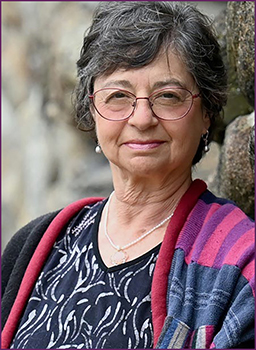
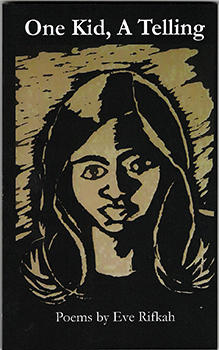
One Kid, A Telling
One Kid, A Telling: $13.00 + $3.00 Shipping
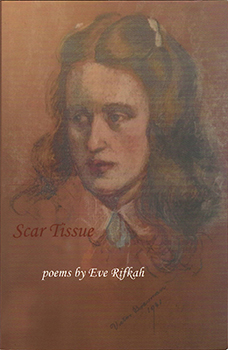
Scar Tissue by Eve Rifkah
In Scar Tissue, Eve Rifkah reveals the emotional and physical scars of her Aunt Cora and the secrets of family history. We see Cora in childhood rejected by her birth mother, the Jew in a Catholic foster home, tolerated and overworked by her foster mother, and in adulthood as she builds a career as a nurse and a personal life as wife and mother. Written in understated yet sharply etched brushstrokes, Rifkah’s poems deftly balance lyricism and insight, trauma and madness alongside perseverance and defiance. This is a deeply affecting profile in courage—on Save e not to be missed.
–Yermiyahu Ahron Taub, author of The Education of a Daffodil: Prose Poems
Scar Tissue, the apt title of Eve Rifkah’s latest collection, implies not only injury and healing but also connection. This unflinching account of a woman’s tragic life begins with young Cora’s poignantly qualified family relationships—“not uncle,” “not sister,” “the man called father,” “foster mother,” “step mother,” “birth mother,” “not mother,” “no mother”—and leads to her disappointing marriage, the losses of her children, and her years spent nursing the sick and dying. Halfway through the sequence, however, the speaker enters as someone who can bear witness to the bravery of Cora’s love, despite such suffering. The poems’ startling minimalism—as when young Cora notices how “anger strawberries father’s face”—suggest that each word was carefully chosen to embody deep reservoirs of unspoken experience. A sense of the hidden and unnamed resonates throughout this moving collection, evoking invisible scars, fault lines, and scattered fragments, “pieces big enough to/ fall through.” Yet still, in a kind of miracle, the essential moments of Cora’s life are recovered and made whole when they are shared with someone else, as “lost secrets rattle the wires/ shaking between us.”
–Susan Elizabeth Sweeney, author of Hand Me Down
Though Mama Corinne (Cora) had inner turmoil and outer struggles, she become an inspiration and was loved by everyone who knew her. Eve Rifkah has a special place in her heart for Cora and, with her unique and brilliant style of poetry, her love and appreciation for her aunt shines off every page and poem. With hopes that my mother’s memory will continue to bring hope and inspiration to all.
–Kenneth Kamiel (son)
Scar Tissue: $15.00 + $3.00 Shipping
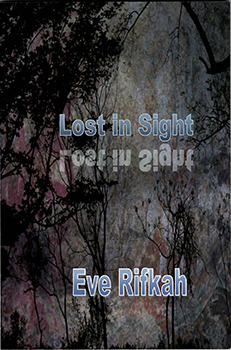
Lost in Sight by Eve Rifkah transports the reader within an internal landscape beating its wings in the heart of the natural world. The speaker begins as “a stranger / even to herself” as she navigates the way. “In the pathways”, a poem incorporating the title as first line, continues” of fallen stones and tangled briar / there is a way to open up from hiding” and throughout the poems, the speaker emerges through birdsong, fairytale, memory and story. Rifkah often combines words that need combining. in “This Noise” “whatyouwishfor” is one; “sunsparkle”, sunwarmth”, and “rootbone” are others (“Destination”). She also uses spaces between and around words as a kind of punctuation by air. Will she know herself, “….tie the ends of her life together / on the sharp shafts of her needles…” (“Spindle”), or “….enter like smoke / like a figment / sleepwalk death / write poems in the air…”?
Lost In Sight: $20.00 + $3.00 Shipping
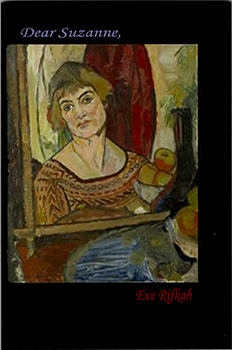
Dear Suzanne, unfetters a complex series of portraits to explore the ways that making art sustains and liberates in a long and fully lived life of a woman. In this novel-in-verse, with its invocation of Paris and impressionist artist Suzanne Valadon – perhaps best known as the model in Renoir’s Dance at Bougival – the poems explore the struggles and joys of finding voice and overcoming silence through making art, a way of living over time and space and of living within and outside family, in looking at the multiple roles a woman lives as daughter, mother, wife, lover, artist and colleague. Valadon’s story, as well as that of husband, artist, André Utter, and son, artist Maurice Utrillo, are told in verse, while those of the contemporary speaker who looks to and imagines this artist’s story, are delivered as prose poems.
Dear Suzanne: $18.00 + $3.00 Shipping
